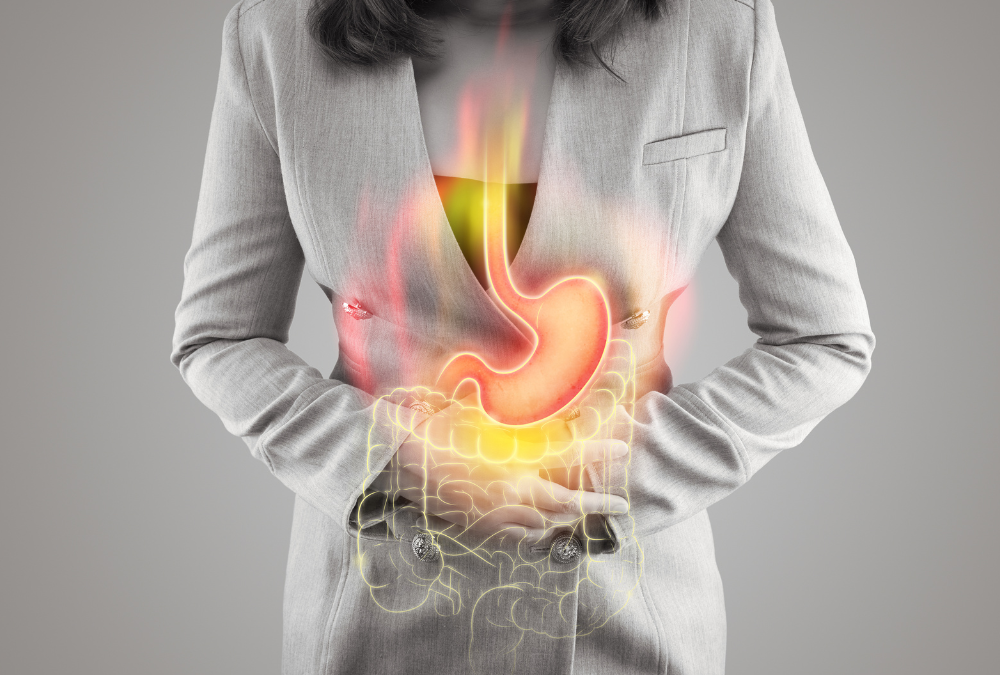Gastroesophageal Reflux Disease (GERD) is a common digestive condition that occurs when stomach acid backs up into the esophagus, the tube that connects your mouth to your stomach. This can cause a burning sensation in the chest, known as heartburn, along with allergies causing acid reflux, chest discomfort, and other unpleasant symptoms. While fatty foods, caffeine, and smoking are well-known triggers of GERD, there’s a surprising connection between GERD and allergies that many people don’t realize. This article explores how allergies can trigger or worsen GERD symptoms, and what you can do to find relief.
What is GERD?
GERD, or Gastroesophageal Reflux Disease, is a digestive disorder that occurs when stomach acid or bile flows back up into the esophagus. This backflow, often referred to as acid reflux, can irritate the lining of the esophagus, leading to various symptoms.
The Role of the Lower Esophageal Sphincter (LES)
The LES is a muscular ring located at the bottom of the esophagus.It acts as a valve, opening to allow food and liquids to pass into the stomach and then closing tightly to prevent stomach contents from flowing back up. When the LES relaxes inappropriately or weakens, stomach acid can escape into the esophagus, triggering GERD symptoms.
Common Triggers of GERD
Several factors can contribute to GERD, including:
- Dietary Factors:
- Fatty Foods: High-fat foods can relax the LES and slow down digestion.
- Spicy Foods: Spicy foods can irritate the esophagus and trigger reflux.
- Acidic Foods: Citrus fruits, tomatoes, and vinegar-based foods can worsen GERD symptoms.
- Alcohol: Alcohol can weaken the LES and irritate the esophagus.
- Caffeine: Caffeine can relax the LES and increase stomach acid production.
- Lifestyle Factors:
- Smoking: Smoking can weaken the LES and irritate the esophagus.
- Overeating: Eating large meals can put pressure on the LES.
- Lying Down After Eating: Lying down shortly after eating can increase the risk of acid reflux.
- Certain Medications:
- Aspirin and NSAIDs: These medications can irritate the stomach lining.
- Calcium Channel Blockers: These medications can relax the LES.
Understanding Allergies and Their Impact on Digestion
Allergies occur when the body’s immune system overreacts to a harmless substance, such as pollen, dust mites, or certain foods. This reaction can trigger inflammation throughout the body, including the digestive system. This inflammation can disrupt normal digestion and contribute to GERD symptoms. Three main types of allergies can impact digestion:
- Food allergies and GERD: These allergies cause an immune response to specific foods, such as dairy or gluten.
- Seasonal allergies: These allergies, often triggered by pollen, can cause postnasal drip, which is excess mucus that drains down the back of the throat. This mucus can irritate the esophagus and contribute to GERD.
- Sensitivities: Food sensitivities are not true allergies, but they can still cause digestive discomfort similar to GERD.
How Allergies Can Contribute to GERD

- Postnasal drip: As mentioned earlier, excess mucus from allergies can irritate the esophagus and trigger reflux.
- Eosinophilic esophagitis (EoE): This condition is caused by an allergic reaction in the esophagus, leading to inflammation and symptoms that mimic GERD.
- Food triggers: Certain food allergies, particularly to dairy or gluten, can worsen reflux symptoms in some people.
- GERD triggers from allergies: Allergies can significantly contribute to GERD symptoms, particularly through postnasal drip, EoE, and food sensitivities.
- Can allergies worsen GERD?: Yes, allergies can exacerbate GERD symptoms, making it essential to identify and manage underlying allergies for effective GERD treatment.
Recognizing the Signs of Allergy-Related GERD
While acid reflux and seasonal allergies can often coexist, it’s important to recognize the specific signs that might indicate an underlying allergy contributing to your GERD symptoms.
Symptoms of Allergy-Related GERD
Some symptoms of allergy-induced GERD overlap with regular GERD, such as:
- Heartburn: A burning sensation in the chest
- Nausea: A feeling of sickness or urge to vomit
- Difficulty Swallowing: A sensation of food getting stuck in the throat
However, some key signs might point to an underlying allergy:
- Allergy Symptoms:
- Sneezing
- Itchy eyes, nose, or throat
- Postnasal drip (mucus dripping down the back of the throat)
- Coughing
- Congestion
Red Flags for EoE or Food Allergy
If you’re experiencing persistent GERD symptoms and allergy symptoms, even after treatment, it’s important to consider other potential causes, such as:
- Eosinophilic Esophagitis (EoE): This condition is characterized by inflammation in the esophagus caused by an allergic reaction to certain foods.
- Food Allergies: Certain food allergies, such as dairy, gluten, or soy, can trigger GERD-like symptoms.
If you experience any of the following, it’s important to consult with a healthcare professional:
- Persistent GERD symptoms despite treatment
- Difficulty swallowing
- Chronic cough
- Hoarseness
- Sore throat
- Unexplained weight loss
- Food impaction
Diagnosis and Testing
To accurately diagnose GERD and identify any underlying allergies or conditions, your healthcare provider may recommend various tests:
GERD Tests:
- Endoscopy: This procedure involves inserting a thin, flexible tube with a light and camera into the esophagus to examine the lining for any damage or inflammation.
- pH Monitoring: This test measures the acidity levels in the esophagus over a 24-hour period to determine the frequency and severity of acid reflux episodes.
Allergy Testing:
- Skin Prick Test: A small amount of allergen is pricked onto the skin to assess the body’s reaction.
- Blood Test: This test measures the levels of specific allergy antibodies in the blood.
- Elimination Diet: This involves removing certain foods from the diet to identify potential food allergens.
Identifying Eosinophilic Esophagitis (EoE):
To diagnose EoE, a healthcare provider may perform an endoscopy with biopsies. During this procedure, small tissue samples are taken from the esophagus and examined under a microscope for signs of eosinophil inflammation.
Managing Allergy-Triggered GERD
Managing Allergy-Triggered GERD
A comprehensive approach to managing allergy-triggered GERD involves a combination of lifestyle modifications, dietary adjustments, and medical treatments.
Lifestyle Changes:
- Identify and Avoid Food Allergens: Work with an allergist to determine specific food triggers and eliminate them from your diet.
- Manage Seasonal Allergies: Use over-the-counter antihistamines or prescription medications to control symptoms like sneezing, runny nose, and itchy eyes.
- Maintain a Healthy Weight: Excess weight can put pressure on the LES, worsening GERD symptoms.
- Elevate the Head of Your Bed: Raising the head of your bed by 6-8 inches can help reduce nighttime reflux.
- Avoid Trigger Foods and Drinks: Limit intake of fatty foods, spicy foods, acidic foods, alcohol, and caffeine.
- Quit Smoking: Smoking weakens the LES and irritates the esophagus.
Dietary Adjustments:
- Allergen-Free Diet: If you have a food allergy, consult with a registered dietitian to develop a personalized allergen-free diet plan.
- Anti-Inflammatory Diet: Incorporate anti-inflammatory foods like fruits, vegetables, whole grains, lean proteins, and healthy fats into your diet.
Medications:
- Allergy Medications:
- Antihistamines: Reduce allergy symptoms by blocking histamine, a chemical released during an allergic reaction.
- Nasal Corticosteroids: Reduce inflammation in the nasal passages.
- Leukotriene Modifiers: Block the effects of leukotrienes, chemicals involved in inflammation.
- GERD Medications:
- Antacids: Neutralize stomach acid, providing temporary relief.
- H2-Receptor Blockers: Reduce stomach acid production.
- Proton Pump Inhibitors (PPIs): Significantly reduce stomach acid production.
When to See a Doctor
If you experience persistent or worsening GERD symptoms, or if GERD treatments aren’t effective, it’s important to see an ENT doctor near me. Additionally, if you suspect EoE or have severe allergies, seeking professional medical help is important.
Conclusion
The connection between GERD and allergies is a significant factor to consider when managing GERD symptoms. Identifying and addressing underlying allergies can significantly improve your quality of life. If you suspect allergies may be contributing to your GERD, reach out to an ENT doctor in Glendale for proper diagnosis and treatment. Remember, managing your allergies can be key to controlling your GERD.

